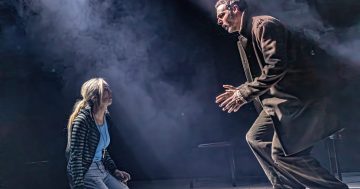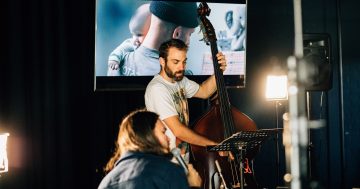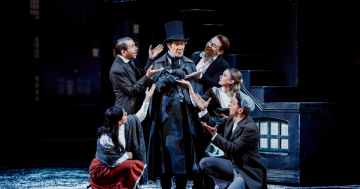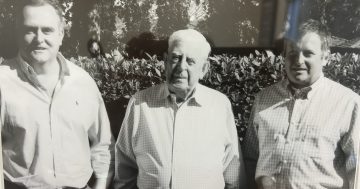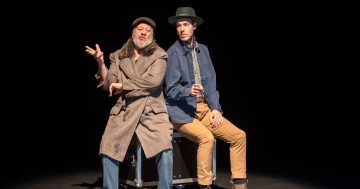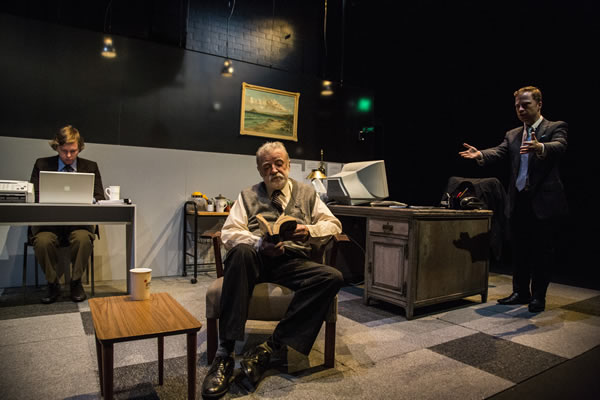
Bartleby, Julian Hobba’s modern-day adaptation of the parable by Herman Melville, recreates the malaise of the office and shows us the disintegration of a man no longer able to cope with working life. If to work is to live, perhaps he’d just prefer not…
Hobba does an excellent job of adapting the story to a modern setting. In the original story Bartleby joins a relaxed but successful Wall Street firm as a scrivener (essentially a scribe) where he distinguishes himself with industry and productivity before mysteriously refusing to work (“I would prefer not”) and later to even eat. Here Bartleby is an office assistant who takes over his ageing boss’ workload until the company depends on his manic industry for survival. Hobba raises the stakes by giving the boss a young and deeply ambitious partner who fights against Bartleby’s employment and ultimately forces the boss to make a choice between Bartleby and the business.
Ben Crowley is superb as Bartleby, a haunted workaholic who plunges into paperwork to stop his inner demons from catching up with him. When he finally decides to stop working his “prefer not” is volcanic, a long-coming eruption of grief and anger that depletes him so completely that he slips into catatonia. Crowley’s performance is easily the strongest part of the play and paradoxically his inner struggle is the most dynamic part of the performance.
Max Cullen is also solid as the ageing yet kindly boss: by turns silly, wise, and possibly senile. He and Bartleby establish a genuine rapport and Cullen provides beautiful moments of genuine tenderness. Here the boss is firmly on Bartleby’s side and struggling against external events (represented by the young lawyer). Cullen also treats us to a fine rendition of another famous Melville character in a clever dream sequence that ends act one.
I was less sure of Dene Kermond’s performance as the young lawyer. Kermond veers towards over-acting with a character so highly strung that he comes across as crazy. At one point he physically assaults Bartleby (because, oddly enough, Bartleby has done some important work and saved the firm). Afterward he insists that an office incident report be filed, a public declaration that his behaviour (i.e. assault) was inappropriate – this is clearly not a well man. Yes, the character is a satire of Sir Humphrey-esque love of bureaucracy for its own sake, but it’s so overdone (especially when contrasted with restrained performances from Crowley and Cullen) that it draws focus from Bartleby’s declining mental health. Rather than a firm with one problematic employee, this is a workplace where everyone is either senile, depressed or demented.
In a way, Hobba has done too good a job of modernising the story. We have a better understanding of mental illness and some of us will have actually experienced a co-worker whose declining mental health created workplace problems. The modern setting unavoidably make’s Bartleby’s problem medical, and indeed he actually ends up in professional care at the end of the play. Here we can see Crowley’s anger and grief on his face: presenting the story as theatre strips away a lot of the mystery in Melville’s original. Rather than imagining a Bartleby of our own we are presented with a single specific Bartleby.
In a way I feel that the show would have been better off as a one-act play. A lot of time is spent re-creating the slowness and annoyance of office life and while the play does an excellent job of this it isn’t necessarily the most interesting thing to watch on stage The second half where Bartleby becomes the star of his own story is easily the best part of the play. It could be argued that the time spent building the world creates the context for Bartleby’s emotional decline, but I think audiences already have an instinctive understanding of how offices can crush souls. We spend two hours circling an enigma, peering at him in a hope of understanding – but we never truly get close to him. There are definitely some powerful moments in the show, but the audience as much as Bartleby have to survive the trials of office life before they can be rewarded.
When: 26 July to 3 August
Time: 7:30pm, 6:00pm
Where: The Street Theatre
Price: $35, concession $32
Tickets: http://www.thestreet.org.au/?page=Bartleby












